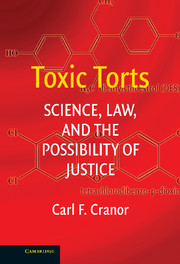Book contents
- Frontmatter
- Contents
- Preface
- 1 The Veil of Science over Tort Law Policy
- 2 Legal Background
- 3 Institutional Concerns about the Supreme Court's Trilogy
- 4 Studies of Toxicity and Scientific Reasoning
- 5 Excellent Evidence Makes Bad Law: Pragmatic Barriers to the Discovery of Harm and Fair Admissibility Decisions
- 6 Science and Law in Conflict
- 7 Enhancing the Possibility of Justice under Daubert
- 8 Is Daubert the Solution?
- Bibliography
- Index
2 - Legal Background
Published online by Cambridge University Press: 08 January 2010
- Frontmatter
- Contents
- Preface
- 1 The Veil of Science over Tort Law Policy
- 2 Legal Background
- 3 Institutional Concerns about the Supreme Court's Trilogy
- 4 Studies of Toxicity and Scientific Reasoning
- 5 Excellent Evidence Makes Bad Law: Pragmatic Barriers to the Discovery of Harm and Fair Admissibility Decisions
- 6 Science and Law in Conflict
- 7 Enhancing the Possibility of Justice under Daubert
- 8 Is Daubert the Solution?
- Bibliography
- Index
Summary
INTRODUCTION
The law is one of the complex institutions that must be understood in order to identify the science-law issues, to see why they are so critical to the functioning of the legal system and to understand why mistaken decisions about the admission of expert testimony can be of wider social concern. Moreover, for both historical and ongoing disputes, it is important to understand why some of the legal changes have occurred.
This chapter first provides some institutional background about the tort law, including some specific steps in civil procedure, in order to identify the stage at which courts consider the admissibility of evidence. This reveals why admissibility decisions at this point in the timeline leading to a trial can be so crucial to the litigants (mainly the plaintiffs), to the law, and to society more generally. Second, it sketches the context in which the U.S. Supreme Court decided to take the legal admissibility of scientific evidence. Finally, it considers three recent U.S. Supreme Court cases and how these have modified the admissibility of expert testimony and its scientific basis, and some recent amendments to the Federal Rules of Evidence subsequent to the Court cases.
THE TORT LAW
The legal actions that are of concern arise in the tort or personal injury law. Tort law is that
body of law which is directed toward the compensation of individuals, rather than the public, for losses which they have suffered within the scope of their legally recognized interests generally, rather than one interest only [such as contracts], where the law considers that compensation is required.
- Type
- Chapter
- Information
- Toxic TortsScience, Law and the Possibility of Justice, pp. 31 - 61Publisher: Cambridge University PressPrint publication year: 2006



